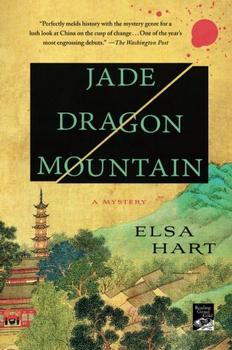Reading Guide Questions

Please be aware that this discussion guide will contain spoilers!
- Hamza tells stories for a living. Although they may be based in reality, these stories are largely spun out of his imagination. At one point, we find out the killer was inspired by one of Hamza's stories when he planted a fake suicide note under Li Du's bed. How do Hamza's tales mirror the story of the novel itself? How have stories influenced your decisions or made their way into reality?
- In Tulishen's court, manners and decorum are very important, and many of the foreigners fumble when it comes to kowtowing and other social nuances of China. At one point, Li Du shows Hugh Ashton the proper way to brew and serve tea. How important are rituals and customs in your culture? How important should they be?
- Following his exile from the capital, Li Du stayed away from society and became a traveling scholar of sorts, a "scholar recluse." We find out that he generally does not like to be a part of court life and rushes to leave Dayan as soon as he is given permission. In light of this, what about the unsolved murder drew him back? What compelled him to act against his instinct?
- Following his exile from the capital, Li Du stayed away from society and became a traveling scholar of sorts, a "scholar recluse." We find out that he generally does not like to be a part of court life and rushes to leave Dayan as soon as he is given permission. In light of this, what about the unsolved murder drew him back? What compelled him to act against his instinct?
- Tulishen, who is also Li Du's cousin, mentions to Li Du at one point that Li Du was long thought by the family to be the smarter one, the one meant for a magistrate position and great power. Why do you think Li Du passed up on the opulence and prestige of higher office to be a humble librarian? If Li Du desired it, do you think he could have achieved the professional success of Tulishen? What matters more to success—innate intelligence or conniving ambition?
- When Brother Pieter dies, Tulishen at first accepts that it was due to natural causes. When Li Du declares foul play, Tulishen is willing to hoist blame on the Khampa. Li Du also deduces that if he had died from the poisoned wine, Tulishen would have gladly believed his death was suicide. Tulishen repeatedly accepts an easy lie, partly so as to not have to deal with an inconvenient truth. Can you recall an instance when you have done the same? How conscious was this acceptance?
- Brother Pieter and Hugh Ashton are both guided by curiosity and a desire to understand the world around them. Tulishen, and Lady Chen to a certain degree, are guided by a desire for status and power. Jia Huan, we find out, is motivated by political dogma and deep patriotic beliefs. What do you think Li Du is guided by? Hamza?
- We find out that Hugh Ashton lied about his identity in order to pursue a harmless dream of studying botany in China. Do you think lying is acceptable if it isn't harming anyone?
- At the end of the novel, Li Du suggests that Mu Gao and old Mu write down the lost books of the Mu kings, as a manner of quiet rebellion. Before that, they were pasting anti-Qing messages on the walls of the city. Which method is more effective? Can you recall instances of silent protest that have made a larger impact than vocal actions?
- Throughout its long history, China has vacillated between periods, sometimes dynasties-long, of extreme isolationism on one hand and more open borders on the other. What does a nation stand to gain from opening itself to ambassadors and traders like Nicholas Gray, missionaries like the Jesuits and Dominicans, and intellectual explorers like Hugh Ashton? What does it stand to lose?
- Li Du encourages Mu Gao and Old Mu to write their stories down. Hamza, on the other hand, refuses to transcribe his own tales, saying "Books are for government records and alchemical recipes and all the insipid wisdom of Confucius, not for stories." Why do you think he feels this way?
- Thinking of the emperor's "command" of the eclipse, and the scientists' tacit alliance of this display, how does the shifting balance between science, religion, and superstition influence power and politics in this era? What about in other times in history? Or in our own country, historically or today?
Unless otherwise stated, this discussion guide is reprinted with the permission of St. Martin's Griffin.
Any page references refer to a USA edition of the book, usually the trade paperback version, and may vary in other editions.

 Book Reviewed by:
Book Reviewed by:



